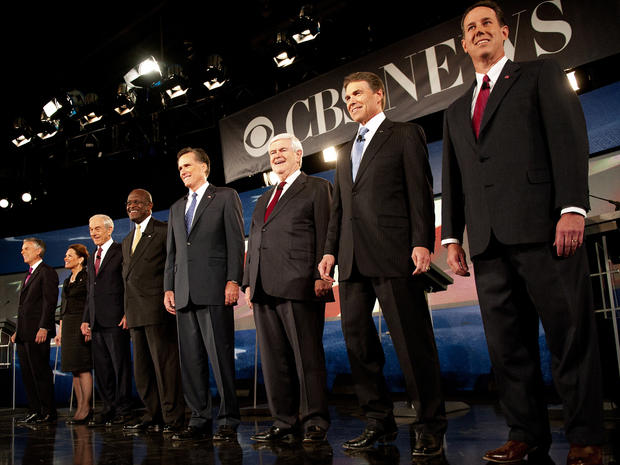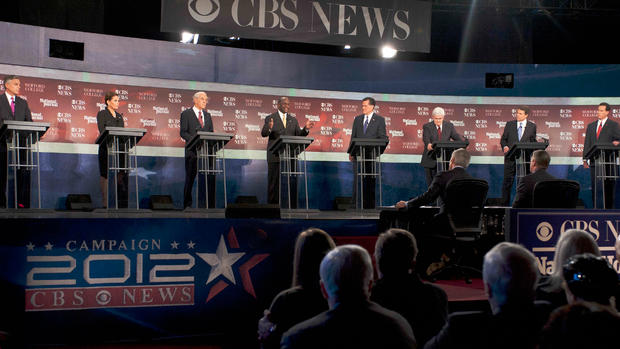CBS News/NJ GOP debate: Winners and losers
The CBS News/National Journal debate Saturday night was the first to focus on foreign policy, and it generated fewer fireworks - but more substance - than many of its predecessors. For that reason we aren't going to simply list winners and losers this time around and instead discuss the candidates' performances - though we're still putting those we thought did best at the top.
Special Report: The CBS News/National Journal Debate
Mitt Romney: Romney has been better than his rivals in presidential debates so often that it's gotten to the point where a strong performance - as he had in this debate - feels almost ho-hum. Romney managed to be hawkish on issues like Iran while also leaving himself a little breathing room, playing to a Republican base that still views him skeptically.
And despite being widely seen as the frontrunner for the nomination, Romney didn't take any serious blows from his rivals. (Gingrich notably declined to elaborate on his not-so-veiled criticism of Romney as little more than a competent manager who wouldn't change Washington.) Romney's only cause for concern: If he's supposed to be the man to beat, why aren't his rivals more eager to take him down?
Romney, Gingrich at GOP debate: We'd go to war to keep Iran from getting nuclear weapons
Newt Gingrich: For one of the most substantive debates of the campaign, Gingrich's depth and command of the issues allowed the former speaker to shine. Gingrich has been accused of scowling in prior debates, but his demeanor Saturday was markedly friendlier. And he scored points with conservatives in responding to a question from debate co-host CBS Evening News anchor Scott Pelley, who pointed out that al Qaeda recruiter and U.S. citizen Anwar al-Awlaki, who was killed by U.S. forces without trial, was not convicted in court. You don't get such privileges if you are at war with the United States, Gingrich said. He also offered more red meat to conservative base, who are looking for a consensus non-Romney candidate, when he said he would be willing to attack Iran to prevent the oil rich nation from obtaining a nuclear weapon.
Gingrich, Romney back Obama killing American accused of turning on U.S.
Ron Paul: Paul is able to provide the biggest contrast with his rivals when he discusses his opposition to U.S. military intervention abroad and what he sees as civil liberties violations against U.S. citizens, and this debate gave him a chance to hit those notes repeatedly. Paul was passionate about issues like his opposition to waterboarding: "It's illegal under international law and under our law," he said. He also called it "immoral," as well as the U.S. government killing U.S. citizens who are suspected of terrorism, saying, "I don't think we should give up so easily on our rule of law."
The polls suggest Paul's brand of hardcore libertarianism has a limited appeal with GOP primary voters, and he remains a serious longshot for the Republican presidential nomination. But his goal is also to get his ideas into the public sphere, and on that front this debate was an unqualified success for him.
Perry: My foreign aid budget starts at zero
Rick Perry: By all measures, Perry exceeded expectations. He touted his military service and spoke passionately on counter-terrorism in way that would appeal to foreign policy hawks. And perhaps even more importantly, his performance was free of the gaffes that he's become known for in debates.
He may have walked into a trap, however, when he answered a follow-up question regarding his proposal to "start at zero" when it comes to foreign aid. When asked via question about whether that policy would apply to Israel, Perry said "yes," although he quickly confirmed his belief that Israel is a critical ally. The response could still prove risky for a Republican candidate when the GOP base so intensely supports Israel. Furthermore, commentators pointed out the U.S. has a 10-year agreement to provide Israel with about $30 billion for security assistance.
Michele Bachmann: Bachmann came to the debate prepared. She sounded well-versed on the ongoing war in Afghanistan and gave specific responses with respect to how she'd handle the war. She was quick to respond to Perry's "start at zero" foreign policy, pointing out that applying that policy to a state like Pakistan -- an unstable country with nuclear capability -- could be risky.
One instance in which Bachmann's performance faltered was during a debate over assassinating an American citizen living abroad who's engaged in terrorism. The congresswoman seemed to miss the point of the question and said she approved of the order to kill Osama bin Laden - who was not, of course, an American citizen.
Transcript of the debate
Fact checking the debate
Rick Santorum: Santorum didn't get as many questions as the more popular candidates in the polls, but when he did get a chance to talk, his remarks sounded thoughtful and measured. Presented with a hypothetical scenario of nuclear weapons from Pakistan going missing, the former senator insisted the U.S. would have to cooperate with the country. And while Santorum took an aggressive stance on the issue of Iran attempting to acquire nuclear capabilities, he was able to cite his history of working on the issue in Congress -- an advantage over the other candidates.
Jon Huntsman: The former ambassador to China didn't get to say much, but when he did he was able to articulate his vision clearly. Unfortunately for Huntsman, that may not matter for a candidate who is consistently at the bottom in polls of the GOP contenders. For the candidates less favored by GOP primary voters, breaking through to get airtime is always a challenge, and it was no different for Huntsman.
Herman Cain: Cain came into this debate having shown almost no
knowledge on foreign policy issues, and the fact that he got through all
90 minutes without any serious gaffes has to be considered something of
an accomplishment. But Cain also failed to put to rest concerns that he
doesn't have the knowledge to lead on the international stage, often
offering vague and unspecific responses when pressed on details. The good
news for the former Godfather's Pizza CEO is that the election is almost certainly going to be
decided on the economy, an area where he has shown himself to be far
more convincing.
Analysis: Cain held his own, but answers didn't show depth
:
GOP candidates on Pakistan: Friend or foe?
Perry: All countries start at zero foreign aid
Bachmann on increasing military spending
Cain on dealing with the Arab Spring
Post-debate analysis with CBS News political director John Dickerson

